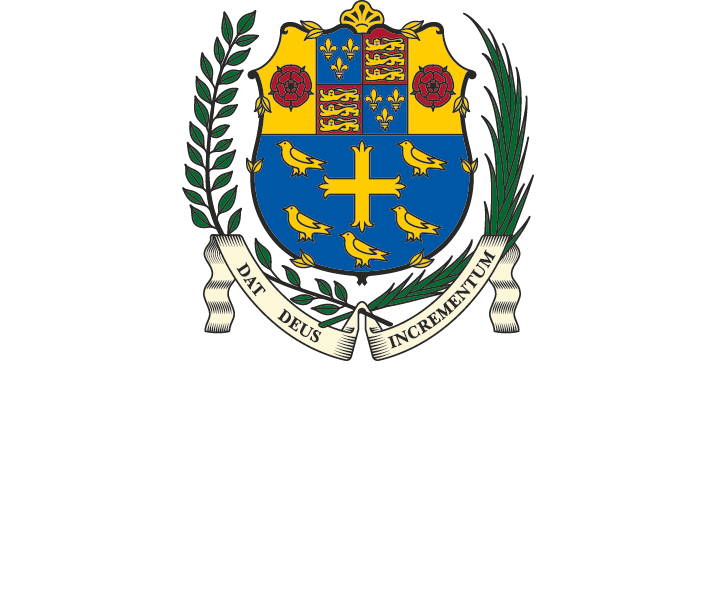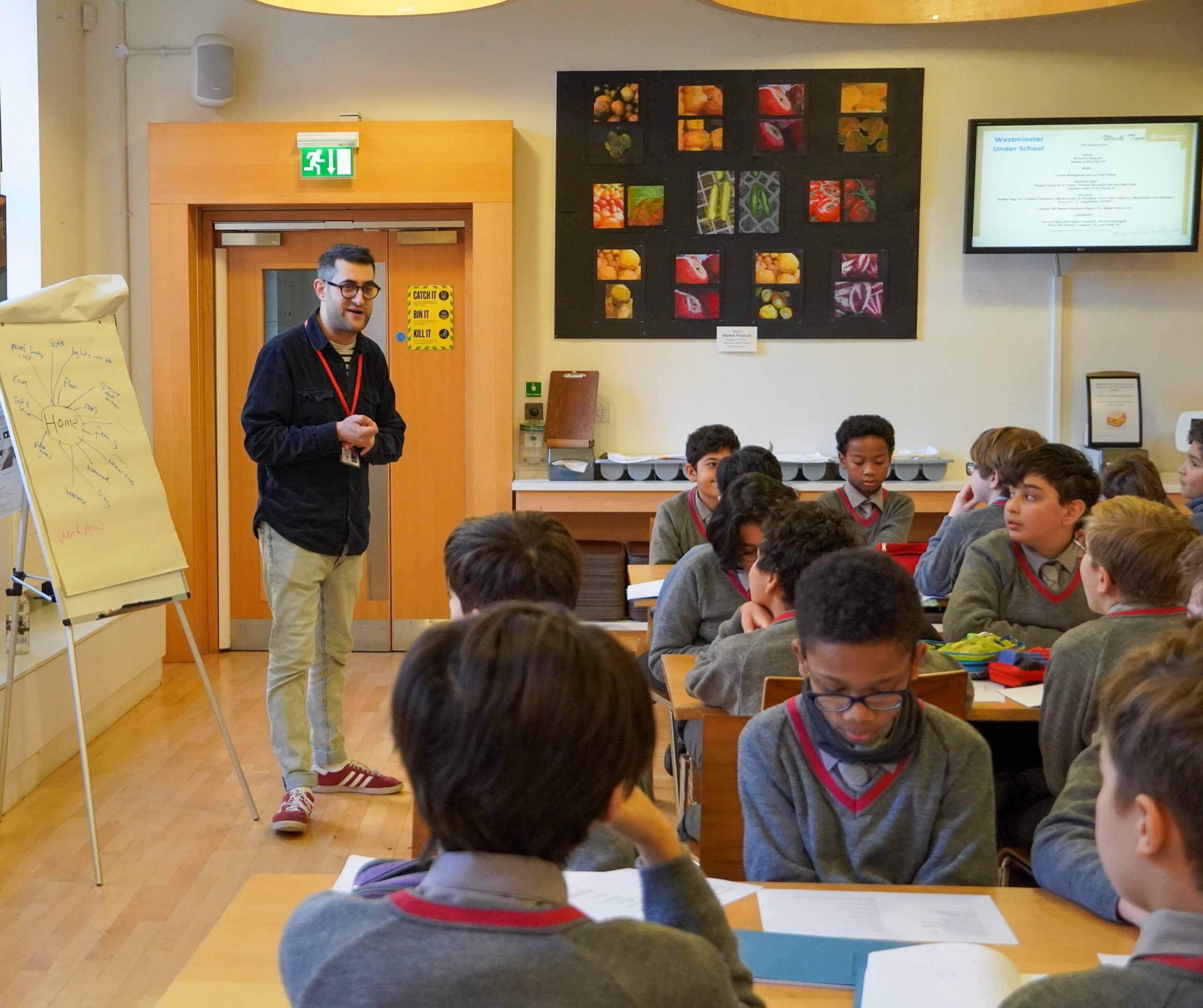Year 7 experienced the magic of poetry at the recent Poetry Live 2024 event, an incredible opportunity to watch some world-class poets perform their much-loved works. It was their first time attending the event, typically targeted at GCSE students. This experience coincided perfectly with their current exploration of poetry from diverse cultures, inspiring them to produce some of their own wonderful work on National Poetry Day.
The performances helped pupils explore the difference in how poetry can be written and performed, with the Poet Laureate Simon Armitage being a particular highlight and an unforgettable experience for the boys. He began with ‘Zodiac T-Shirt’, before moving on to some powerful pieces based on accounts he had with soldiers. It was fantastic to hear him explain the writing process and the images within his poems. One very lucky Year 7, Thomas, even got to ask him a question!
We then saw Owen Sheers, a Welsh poet who writes beautifully about nature and his family, as well as reading from his ode to the National Health Service, To Provide All People. Imtiaz Dharker shared Tissue, about the little things we have like receipts and ticket stubs that make up the essence of our lives, and her clever Over the Moon, exploring the power of language. The event was opened by Daljit Nagra with his popular Singh Song! Our final poet was the ever-popular and much-anticipated John Agard, always a pleasure to listen to and a keen favourite of the boys. His delivery of Checking Out Me History did not disappoint.
We also benefitted from two invaluable sessions from the chief examiner of one of the GCSE boards. He spoke to the children about how to tackle poetry analysis and the importance of demonstrating their own thoughts and interpretations in their essays.
This all led nicely into our celebration of National Poetry Day where the whole school enjoyed a varied range of poetry including new pieces from Simon Armitage and classics from John Agard—two of the world-class poets Year 7 were fortunate enough to see at Poetry Live 2024.
The experience also seamlessly tied into this term’s English lessons, enriching our budding poets’ understanding of cultural identity. They have been looking into what makes them who they are, how various writers have utilised a range of techniques to convey their own stories, and how they can express this themselves in different forms of writing and members of Year 7 have applied all they learnt to produce some wonderful work.
It has been so exciting to celebrate, explore and appreciate the amazing diversity of our student body. Below are a few examples from our weekly WUS in words. John and Alex’s poems revel in the multitude of cultures that shape us, both as individuals and as a whole society. In contrast, Christos-Marios’ informative prose (from which is taken a short extract) explains the difficulties that can arise due to differences, even within the same religion.
Proud of my Heritage
In England’s green and pleasant land, I reside,
A child of Nigeria and Jamaica, with roots worldwide,
Proud of my heritage, of the lands I call home,
In my heart, their stories forever roam.
From bustling Lagos to sunny Montego Bay,
Their vibrant cultures in my soul hold sway,
The rhythm of Nigeria, the warmth of Jamaica,
In my veins, their essence, a joyful array.
Though England’s streets I’ve known all my days,
My roots in Nigeria and Jamaica forever blaze,
I am a blend of worlds, a tapestry so bright,
In my identity, their colours unite.
The flavours of Nigeria, the taste of Jamaica,
In my upbringing, a beautiful panorama,
I cherish their traditions, their songs, their lore,
In my heart, their essence I deeply adore.
And triumphs of those who paved my way,
I honour their legacy, day by day.
In England’s embrace, I find my place,
A melting pot of cultures that I embrace,
But never forgetting the lands of my birth,
In my essence, they hold infinite worth.
Proud of my roots, of where I come from,
Nigeria and Jamaica, my beating drum,
In my journey, their spirits guide my way,
Their love and strength, in my heart, will stay.
I’ll never forget where I come from,
A proud mix of cultures, a multicultural grace
And triumphs of those who paved my way,
I honour their legacy, day by day.
John
Human Soup
If the world was all painted in grey,
And all the songs had just one note to play,
Who we were there’d be no way to say.
Our own human soup has a taste of its own
The different flavours are how we’re all known.
When I was born, the whole world was me.
Then from the unity I struggled free,
I learnt from the differences who I could be.
I realised that we lacked the same face
And started out from a different place.
These unique ingredients make up our soup.
They help us taste different from the whole group.
And write our own part inside the troupe.
We are all born equal, but have our own names,
Though we are all different our value’s the same.
Alex
The Culture Clash of the Two Easters: an extract
Culture clashes occur when people from different cultures interact. These interactions might enrich the life of the people involved, by bringing new tastes, sounds or sights. However, sometimes the inevitable differences between their customs or beliefs become apparent. The outcome could be anything from curiosity to uneasiness, or even fights, as the holders of these diverse customs and beliefs want to hold on to their own. In my case, I live in the U.K., a country where religion is not very important, with just over one-third of the population identifying as atheist. Conversely, the largest religious group is Christianity, covering 46.2% of the population. This percentage is mostly made up of Anglicans and Roman Catholics. My family and I are of the Eastern or Greek Orthodox faith, and religion plays an important part of our lives. This clash creates some challenges in my everyday life, particularly to customs related to the celebration of one of the most important dates in the religious calendar, Easter.
Many of the clashes around Easter customs and celebrations are caused by a difference of dates. In the Eastern Orthodox Church, most holidays follow the Gregorian calendar. However, Easter, the most important celebration for the Eastern Orthodox Church is based on the Julian calendar, the calendar used before the Gregorian. Being that the Gregorian calendar was introduced by Pope Gregory, when the calendar started getting adopted in Orthodox countries, many Christians rejected the new calendar, as it was an idea originating from the “evil” Pope. Although the Orthodox Church used the new calendar for all its holidays, they decided that Easter would be kept with the Julian calendar, in order for all Christians to celebrate together, since Easter is the most important holiday for Orthodox Christians. Both Easters’ dates are determined by the first full moon of Spring, but with a different understanding on which date Spring commences. This means that there is a difference in dates between Western and Eastern Easter. For example, this year Western Easter is on the 31st March, as opposed to Eastern Easter on the 5th May. Here in England, public holidays are fully aligned with the Western Church, causing a clash regarding observation of my religion, and attending School and other activities.
Christos-Marios

